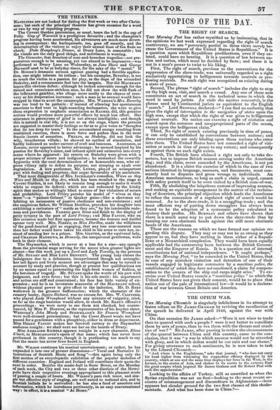TOPICS OF THE DAY.
THE RIGHT OF SEARCH.
THE Morning Post has rather mystified us by insinuating, that in the opinions we last week expressed regarding the right of search controversy, we are "perversely partial to those views merely be- cause the Government of the United States is Republican." It is a question upon which Republican predilections, even if they ex- isted, could have no bearing. It is a question of law between na- tion and nation, which must be decided by facts ; and these it is not in a man's power to twist to his liking. First, The right of search, previous to the conventions for the suppression of the slave-trade, was universally regarded as a right exclusively appertaining to belligerents towards neutrals or pro- fessing neutrals. No such right was recognized as existing during a state of peace.
Second, The phrase "right of search " includes the right to stop on the high seas, visit, and search a vessel. Any one of these acts constitutes an act of search in the technical sense in which the word is used by jurists. La visite des navires rencontres, is the phrase used by Continental jurists as equivalent to the English " search." Lord STOWELL declared—" I can find no authority that gives the right of interruption to the navigation of states upon the high seas, except that which the right of war gives to belligerents against neutrals. No nation can exercise a right of visitation and search upon the common and unappropriated parts of the ocean, except upon the belligerent claim.'
Third, No right of search existing previously in time of peace, it can only be established by conventions between nations; and these conventions are only binding upon those nations who enter into them. The United States have not conceded a right of visi- tation or search in time of peace to any extent; and consequently as against them no such right exists. Fourth, The British have claimed a right not only to take de- serters, but to impress British seaman serving under the American flag ; and this claim, never conceded by the Americans, is not yet abandoned. It is a claim the exercise of which in the case of two nations identical in language, manners, and lineaments, must con- stantly lead to disputes and gross wrongs to individuals. An American merchantman, so long as such a claim is urged, cannot with safety permit itself to be even visited by a British man-of-war.
Fifth, By abolishing the iniquitous custom of impressing seamen, and making an equitable arrangement in the matter of the reclaim- ing of deserters, the principal objection which leads the Americans to refuse the concession of a regulated right of search would be removed. As to the slave-trade, it is a smuggling-trade ; and the most efficient way of putting down smugglers has always been found to be the adoption of a systematic policy calculated to destroy their profits. .Mr. BURNLEY and others have shown that there is a much surer way to put down the slave-trade than by running our own obstinate heads against the still more obstinate heads of the Americans.
These are the reasons on which we have formed our opinion re- garding this dispute. They may or may not be so strong as they appear to us, but they have nothing in them either of a Repub- lican or a Monarchical complexion. They would have been equally applicable had the controversy been between the British Govern- ment and the Emperor of Russia. It is a question not of internal constitutions but of national independence. "It ought perhaps," says the Morning Post, " to be conceded to the United States, that in case of any mistaken visitation and detention of one of their vessels engaged in legitimate commerce by a maritime police, the establishment of which they have not sanctioned, a claim for compen- sation to the owners of the ship and cargo might arise." To ex- ercise over United States vessels a "maritime police " to which the United States have not given their consent, would be to place that nation out of the pale of international law—it would be a declara- tion of war between Great Britain and America.


























 Previous page
Previous page